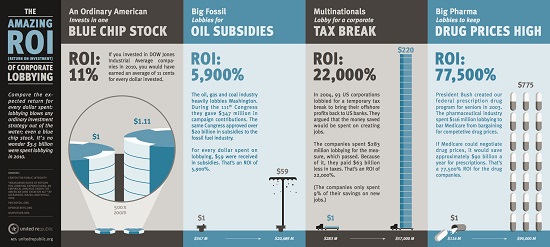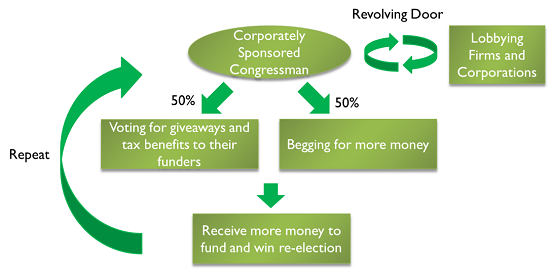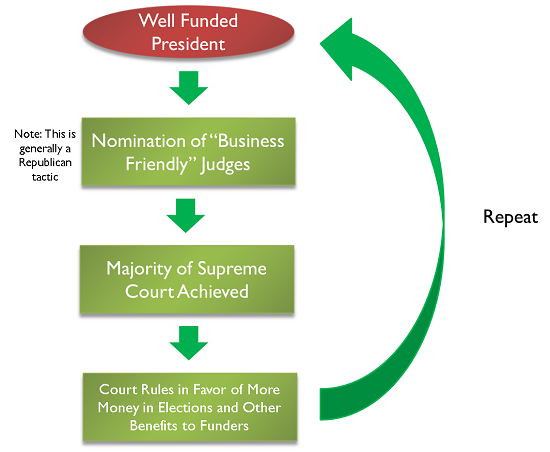rt.com/usa/seven-billion
Purchase of the Legislative Branch:
The process has progressed similarly in Congress. In 1978, outside groups spent $303,000
on congressional races. In 2012 that was up to $457,000,000. That is over 1,500 times
the level in 1978. It would be funny, if it was so blatant and terrifying. By many
accounts, our “leaders” in Congress spend 50% or more of their time working the phones
or fundraisers rather than trying (and failing) to actually do the “people’s business”.
Let’s also take a minute to appreciate the hypocrisy of anyone that pretends that the
money doesn’t influence our government. Businesses do not give to politicians for charity.
This is a payment for services that has proven exceedingly reliable and profitable.
The ROI for money invested in purchasing Congressman is what CEO dreams are made of.
No wonder the incentive is to invest in Congress rather than R&D or marketing.
There are very few places in the world or times in history where you can find ROI’s
in the thousands, or even the tens of thousands.

In addition, increasingly those who work on Congress (and regulators) were previously
employed by these large corporations or expect to work there later. A recent example is
Chris Dodd who left the Senate the head lobbyist for Hollywood at the MPAA, the
guys behind SOPA and PIPA, but there are many many others.
Review: Congressmen beg for money to get elected, make sure to vote the way your
benefactors would like, consequently get more money to get elected again. If at
any point they do lose or quit, they take the big payday to work for those who have
been paying them all along.
Legislative Branch, Check!
www.cnn.com/2013/07/11/politics/congress-election-costs

Judicial Branch Endorsement of the Purchase of Government:
Last but not least, we have the enabling Judicial Branch. It only took a few purchased
presidents to ensure the appointment of a majority of “free market” and “pro-business”
judges. For instance, and disgracefully, Clarence Thomas was once legal counsel for
Monsanto, but has not once recused himself from any cases involving Monsanto and always
votes in their favor.
These radicals have now fully endorsed and enabled the influx of money used to purchase
the other branches. Specifically, 2 major decisions have completely opened the floodgates,
Citizens United and McCutcheon. The first allowed unlimited contributions of corporate
money into elections and brought us the notorious declaration that “corporations are
people” and that “money is free speech”.
This was more recently followed up with the
private wealth equivalent in McCutcheon. In this ruling, Supreme Court Chief Justice
John Roberts said as part of his majority opinion (presumably with a straight face)
“… nor does the possibility that an individual who spends large sums may garner
influence over or access to elected officials or political parties”.
And with this,
the Supreme Court has fully endorsed both major sources of immense wealth to purchase
our elections and consequently our government.
Review: The rich fund Presidential elections, Presidents nominate “business-friendly” judges and then the bought Congress approves their nominations. New judge then votes to ensure even more money is allowed to purchase elections.
Judicial Branch, CHECK!

3. A Faux Republic Dependent Upon the Funders and Not the Voters
The Founder’s Hope and the Sad Reality:
Acknowledging where we are as a country, it is often helpful to look to where we started
for some perspective. Unsurprisingly, this type of problem was not overlooked back in
the 18th century. In 1776, James Madison stated that his goal was to design a republic
in which powerful interest groups would be rendered incapable of subduing the general
will. Madison hoped, perhaps naively, that factions would be thwarted by competing
with other factions.
Sadly, we are now in a time where factions (aka wealthy special interests) subdue the
will of the people and ensure the government responds to them alone on those issues
where they have a “special interest” and consequently asymmetric stakes in the game
(Charles Hugh Smith). As a result, these groups essentially collude to allocate their
resources to their own issues, but do not “thwart” or compete with other factions as
they do the same. It’s a pretty great system, as long as you’re one of the wealthy
few who can use their money to drown out the poor and voiceless many.
And just like that, what was once a Republic has become a corrupt shell of its past self.
All the signs are still there; votes, elections, campaigns, branches of government, etc.,
but behind the scenes the only ones represented are those who can afford to be heard.
Summary: This massive consolidation of wealth, combined with the removal of any limits
on money in campaigns, has allowed for the purchase of our government, or as Dick
Durban once stated, “frankly they [the banks in this case] own the place”. If
money = free speech, then those with all the money, have all the free speech.
What Might Help?
Now that I have likely and thoroughly depressed the reader, let’s bounce around some ideas
for what can be done. As stated in the beginning, this is not an unknown problem and many
people are promoting a number of ways to fix or at least ameliorate the problem.
I will briefly describe just a few which I think provide some direction any of us
could easily implement or support.
Change the Rules: Laurence Lessig of Harvard Law has put forward a visionary
proposal for re-writing the way that campaigns are financed in his book,
Republic, Lost: How Money Corrupts Congress--and a Plan to Stop It.
Put simply, he would like to empower every voter with a stipend, say $150 per
election to give to whatever candidate or candidates they prefer. If you would like
to accept this money, you would need to forgo any other contributions or support
(one would hope including the indirect PAC kind). This would actually provide
even more money than is used in current elections, but would effectively democratize
the funding process. While there would still be a “funding election” that takes
place before the actual election, the funding would not be unequally provided.
Lessig’s work has only begun, as this sort of bill or likely constitutional reform
is nearly impossible to achieve, but he has undertaken and I assume will continue
to implement many brave and creative ways of bringing about the change all American’s
should support.
Most recently he has suggested we begin to fund, ironically enough,
a Super PAC to end all Super PACs. It would be funded with the solitary goal of
changing how money impacts our elections.
Please support them here:
www.mayone.us/
Change Our Day-to-Day: At the more micro level, Charles Hugh Smith believes that we
will inevitably see our overly centralized and inefficient system erode away as it
is replaced by more resilient, local and efficient businesses and societies outside
of the current system. With that in mind, he recommends that “all anyone can do is
the basic things--lower our energy footprint, stay healthy and avoid unnecessary
medications and procedures, support local businesses, organic food growers, etc.
In other words, what we can do is support local businesses that are part of the
emerging economy rather than support corporate cartels.”
Your Vote Does Matter: Do you live in Ohio, Florida or New Hampshire? Probably not.
Despite what we are told every 4 years, there are actually states outside of the
“swing states”, and even more surprising, the very large majority of Americans
live in those states where your “vote doesn’t matter”. New Yorkers an Californians
all know their state will turn Blue no matter who the candidates are and either
don’t vote at all, or often vote for the Blue team in order to feel like they are
on the winning side.
The truth is that if you see the election as Red vs. Blue,
you vote probably doesn’t matter. But here is the trick, if all the people who
think their vote didn’t matter decided to vote for whom they might actually believe
in, then their votes just might matter.
What if all the growing number of “Independents” (who usually still vote Blue), chose
to vote for a third party? What if a third party candidate won a state like New York
or California? What if that candidate was one whose primary promise to the voters
was to champion a change to the role of money in government (perhaps in line with
what Lessig proposes)? Would you vote for such a person? I would argue you should.
If California alone (with 55 electoral votes) were to vote for a 3rd party that
would likely prevent either Red or Blue candidate from winning the requisite 270
electoral votes.
Think about the message that would send to both parties. I would predict that both
sides would start to bend over backwards for an endorsement from that 3rd party and
they would have to get it by taking up the same primary cause for reforming money
in government. Consequently, at the root of our corrupted system which is perpetually
ignored as both sides might suddenly become the big issue of the election. Then
maybe we might begin to turn things around.
Sources:
Charles Hugh Smith (oftwominds, Surivival+, etc.), Yves Smith (Naked Capitalism, Econned),
Laurence Lessig (Republic Lost, multiple TED Talks), Matt Taibbi
(blog at Rolling Stone and now at The Intercept), Zero Hedge, John Robb, Max Keiser,
Clay Shirky (Cognitive Surplus), Aldous Huxley (Brave New World, Brave New World Revisited),
George Orwell (1984), Michael Lewis, Daniel Kahneman (Thinking Fast and Slow),
James Richards (Currency Wars), Han Joon Chang (23 Things They Don’t Tell You About
Capitalism) and Joseph Stiglitz (Mismeasuring Our Lives)
Thank you, Y. Falkson, for a comprehensive presentation on the capture of the political
machinery by enormously concentrated financial wealth.
Administrative note: due to family obligations, email replies will be near-zero
for the next week or so. Thank you for your understanding.
Get a Job, Build a Real Career and Defy a Bewildering Economy
(Kindle, $9.95)(print, $20)

Are you like me?
Ever since my first summer job decades ago, I've been chasing financial security.
Not win-the-lottery, Bill Gates riches (although it would be nice!), but simply
a feeling of financial control.
I want my financial worries to if not disappear at least be manageable and
comprehensible.
And like most of you, the way I've moved toward my goal has always hinged not just on
having a job but a career.
You don't have to be a financial blogger to know that "having a job"
and "having a career" do not mean the same thing today as they did when I first started
swinging a hammer for a paycheck.
Even the basic concept "getting a job" has changed so radically that
jobs--getting and keeping them, and the perceived lack of them--is
the number one financial topic among friends, family and for that matter,
complete strangers.
So I sat down and wrote this book:
Get a Job, Build a Real Career and Defy a Bewildering Economy.
It details everything I've verified about employment and the economy, and lays out an
action plan to get you employed.
I am proud of this book. It is the culmination of both my practical work experiences
and my financial analysis, and it is a useful, practical, and clarifying read.
Test drive
the first section and see for yourself.
Kindle, $9.95
print, $20
"I want to thank you for creating your book Get a Job, Build a Real Career and Defy a
Bewildering Economy. It is rare to find a person with a mind like yours, who can take
a holistic systems view of things without being captured by specific perspectives or
agendas. Your contribution to humanity is much appreciated."
Laura Y.
NOTE: Contributions/subscriptions are acknowledged in the order received. Your name and email
remain confidential and will not be given to any other individual, company or agency.
|
Thank you, Bryce W. ($100), for your outrageously generous contribution
to this site -- I am greatly honored by your steadfast support and readership.
|
|
Thank you, Mark T. ($10/month), for your extraordinarily generous re-subscription
to this site -- I am greatly honored by your longstanding support and readership.
|
"This guy is THE leading visionary on reality.
He routinely discusses things which no one else has talked about, yet,
turn out to be quite relevant months later."
--Walt Howard, commenting about CHS on another blog.
"You shine a bright and piercing light out into an ever-darkening world."
Jeremy Beck
Contributors and subscribers enable Of Two Minds to post 275+ free essays annually.
It is for this reason they are Heroes and Heroines of New Media. Without your
financial support, the free content would disappear for the simple reason
that I cannot keep body and soul together on my meager book sales alone.
Or send coins, stamps or quatloos via mail--please
request P.O. Box address.
Subscribers ($5/mo) and those who have contributed $50 or more annually
(or made multiple contributions totalling $50 or more) receive
weekly exclusive Musings Reports via email ($50/year is about 96 cents a week).
Each weekly Musings Report offers five features:
1. Exclusive essay on a diverse range of topics
2. Summary of the blog this week
3. Best thing that happened to me this week
4. Market Musings--commentary on the economy & global markets
5. From Left Field (a limited selection of interesting links)
At readers' request, there is also a $10/month option.
What subscribers are saying about the Musings
(Musings samples here):
The "unsubscribe" link is for when you find the usual drivel here
insufferable.
Dwolla members can subscribe to the Musings Reports with a one-time
$50 payment; please email me if you use
Dwolla, as Dwolla does not provide me with your email.
The Heroes & Heroines
of New Media:
oftwominds.com contributors and subscribers
All content, HTML coding, format design, design elements and images copyright ©
2014 Charles Hugh Smith, All global rights
reserved in all media, unless otherwise credited or noted.
I am honored if you link to this essay, or print a copy for your own use.
Terms of Service:
All content on this blog is provided by Trewe LLC for informational purposes only. The owner of this
blog makes no representations as to the accuracy or completeness of any information
on this site or found by following any link on this site. The owner will not be liable
for any errors or omissions in this information nor for the availability of this information.
The owner will not be liable for any losses, injuries, or damages from the display or
use of this information. These terms and conditions of use are subject to change at
anytime and without notice.

